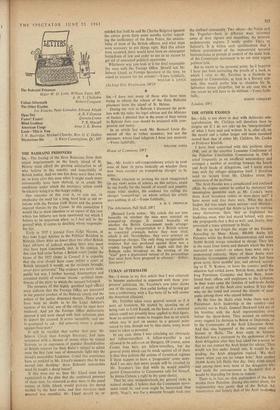The Bahraini Prisoners Major W. 0. Little, William Yates. MP,
A. H. T. Chisholtn Cuban Aftermath Robert Conquest The Other Exodus Jon Kinache, Peter Lumsden, Edward A tiyah
Opus Dei A. R. Villanova
Faster! Faster! Quentin Crewe
Blind Goddess P. R. Mursell American Usage Anne S. K. Brown
Look—This is You J. N. Busbridge, Michael Clanchy, Rev. G. C. Oakley
Mysterious Sin S. Knox Cunningham, QC, MP
THE BAHRAINI PRISONERS
SIR,—The freeing of the three Bahrainis from their unjust imprisonment on the lonely island of St.
Helena must afford the greatest satisfaction to all who believe in the sanctity and impartiality of British justice. And no one has done more than you, sir, to keep alive this issue when it might much more conveniently have been shelved, or to create the conditions under which the necessary action could be taken to bring it to this happy ending.
One outcome of this case is, as you say, to emphasise the need for a long, hard look at our re- lations with the Persian Gulf States and the powers enjoyed therein by the Crown. In this connection I would like to draw attention to an aspect of this case which has hitherto not been mentioned but which I believe to be important when, as I feel will be the general wish, it comes to deciding where responsibi- lity lies. Early in 1057 I learned from. Judge Haynes, at that time Legal Adviser to the Political Resident in Bahrain (there were no fewer than two other British legal advisers of judicial standing there who must also have been concerned), that, in his opinion. 'if this case had come before a British court [under the terms of the 1952 Order in Council it is arguable that the case should have come before a court of British instance] it would, on the evidence brought, never have succeeded.' The evidence was never made public but was. I further learned, documentary and consisted mainly of various 'alaans'--political mani- festoes of the party to which the accused belonged.
The presence of this highly qualified legal official must indicate that the Foreign Office are interested in the general conduct of the Bahrain courts and the
nature of the justice dispensed therein, There could have been no doubt as to the Legal Adviser's
opinion of the trial, nor of the advice he must have tendered. And yet the Foreign Office deliberately ignored it and went ahead with their nefarious plan
to deport the accused. It seems incredible, and one is prompted to ask : did someone nurse a grudge against these men?
It will be recalled that earlier that year Mr. Selwyn Lloyd, then Foreign Secretary, had been
welcomed with a shower of stones when he visited Bahrain, as an expression of popular dissatisfaction at British support for their Ruler's refusal to admit even the first faint rays of democratic light into the island's monolithic feudalism. Could this experience have so rankled in Mr, Lloyd's memory that he was moved into deciding: these, Bahraini nationalists must be taught a sharp lesson?
If this were not so, then Mr. Lloyd must have capitulated to the plea that the continued presence
of these men, far removed as they were in the penal colony at Jidda Island, would prolong the unrest excited by the Suez riots, and that therefore their removal was essential. Mr. Lloyd should be re-
minded that both he and Sir Charles Belgrave ignored the advice given them some months earlier regard- ing the inefficiency of the State Police, the unsuita- bility of most of the British officers, and what steps were necessary to put things right. Had this advice been accepted, there would have been no subsequent breakdown of law and order to use as an excuse to get rid of unwanted political opponents.
Whichever way you look at it the final responsibi- lity rests with the Foreign Office. Should not Mr. Selwyn Lloyd, as Foreign Secretary at the time, be asked to account for his actions?—Yours faithfully, WILLIAM 0. LITTLE 13a Edge Hill, IVitnbledon, SW19


































 Previous page
Previous page